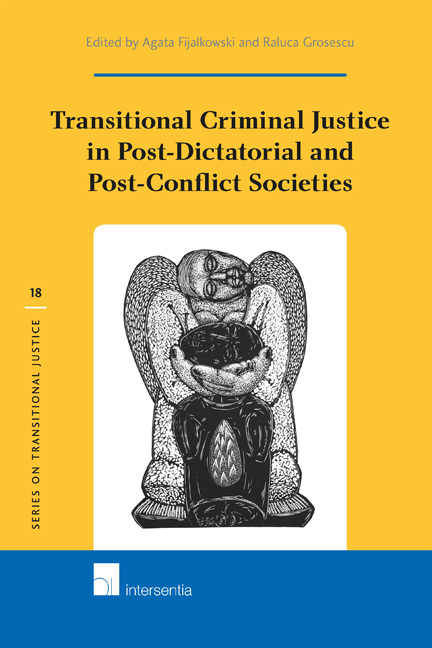Book contents
- Frontmatter
- Contents
- Introduction
- PART I CRIMINAL JUSTICE AS A METHOD OF DEALING WITH THE PAST: OPPORTUNITIES, STRATEGIES, AND LEGAL AND POLITICAL CONSTRAINTS
- Chapter 1 Retrospective Justice: Post-Communist Germany and Poland in Comparative Perspective
- Chapter 2 Transitional Justice in Nepal: Prosecutions, Reform and Accountability Strategies
- Chapter 3 Transitional Trials as History Writing: The Case of the Romanian December 1989 Events
- Chapter 4 Transitional Criminal Justice: The Polish Way
- Chapter 5 Public Contestation and Politics of Transitional Justice: Poland and Albania Compared
- Chapter 6 Consolidating Democracy Through Transitional Justice in Slovenia: Lessons Learnt?
- PART II UNIVERSAL PRINCIPLES V LOCAL PECULIARITIES: THE RELATIONSHIP BETWEEN NATIONAL JURISDICTIONS AND INTERNATIONAL LAW
- About the Authors
Chapter 1 - Retrospective Justice: Post-Communist Germany and Poland in Comparative Perspective
from PART I - CRIMINAL JUSTICE AS A METHOD OF DEALING WITH THE PAST: OPPORTUNITIES, STRATEGIES, AND LEGAL AND POLITICAL CONSTRAINTS
Published online by Cambridge University Press: 28 November 2017
- Frontmatter
- Contents
- Introduction
- PART I CRIMINAL JUSTICE AS A METHOD OF DEALING WITH THE PAST: OPPORTUNITIES, STRATEGIES, AND LEGAL AND POLITICAL CONSTRAINTS
- Chapter 1 Retrospective Justice: Post-Communist Germany and Poland in Comparative Perspective
- Chapter 2 Transitional Justice in Nepal: Prosecutions, Reform and Accountability Strategies
- Chapter 3 Transitional Trials as History Writing: The Case of the Romanian December 1989 Events
- Chapter 4 Transitional Criminal Justice: The Polish Way
- Chapter 5 Public Contestation and Politics of Transitional Justice: Poland and Albania Compared
- Chapter 6 Consolidating Democracy Through Transitional Justice in Slovenia: Lessons Learnt?
- PART II UNIVERSAL PRINCIPLES V LOCAL PECULIARITIES: THE RELATIONSHIP BETWEEN NATIONAL JURISDICTIONS AND INTERNATIONAL LAW
- About the Authors
Summary
'There has for a very long time been a strong feeling against making legislation, and particularly criminal legislation, retrospective […] I use retrospective in the sense of authorising people being punished for what they did before the Act came into force'.
'Writing the recent history of the Central and Eastern part of Europe is unlike the work of the Western historian, who can turn to published sources, contemporary reports, memoirs by participants and eyewitnesses, whose work is embedded in solid, mostly normalized and consolidated public memory. Usually it is not the historian who is the messenger there, unlike the less fortunate part of the world, where the message is, more often than not, bad news. The recent history of Central and Eastern Europe is the history of bad times'.
This chapter examines the similarities and differences of the legal discourses on the prohibition of retroactive laws within the European human rights framework. It also considers the significance of the notion of retrospective justice in the post-dictatorial period (post-1989) in Europe, and more specifically in Germany and Poland. It begins by setting out key legal definitions in national and regional legal frameworks in order to determine what underpins the prohibition on retroactive laws. An examination of key German, Polish and European jurisprudence reveals that the legal narratives on retrospective justice run parallel and in opposite directions, revealing cracks in consensual histories that bring historical sensibility and issues into sharp relief. Retrospective justice in post-Communist Europe contributes a defined set of problems to the field of transitional justice, beginning with the challenges posed by statutes of limitations and ending with unfinished narratives on select chapters of Communist histories.
RESEARCH QUESTION
This chapter examines the similarities and differences in the legal discourses on the prohibition of retroactive laws within the European human rights framework. It also considers the significance of the notion of retrospective justice in the post-dictatorial period (post-1989) in Europe, and more specifically in Germany and Poland. From a common law perspective, for example, the idea of punishing people for an act that was not a crime at the time of commission is regarded as loathsome.
- Type
- Chapter
- Information
- Publisher: IntersentiaPrint publication year: 2015



